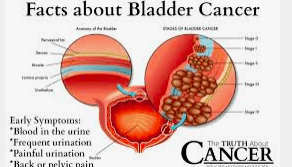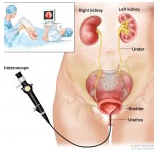Health
Bladder cancer: what are the main causes?

Last Updated on October 30, 2022 by Nurse Vicky
Bladder cancer: what are the main causes?
Bladder cancer is the most common cancer in men and the second most common cancer in women in the world. It is also the most common cancer of the urinary system.
bladder cancer can occur in any stage of development, but it is more common in older adults. There are many causes of bladder cancer that are still unknown, but the following are some of the most common:
smoking, radiation therapy, inherited risk factors (such as a family history of bladder cancer), and previous bladder cancer.
The best way to prevent bladder cancer is to reduce your risk factors as much as possible.
If you develop bladder cancer, treatment options include surgery, chemotherapy, radiation therapy, and targeted therapy.
While there is no cure for bladder cancer, treatment can greatly improve the patient’s prognosis.
What are the warning signs of bladder cancer?

Bladder cancer is a relatively rare cancer, but it’s important to be aware of the warning signs so you can get checked out early.
Some of the most common signs of bladder cancer include changes in how often you go to the bathroom, sudden pain when going to the bathroom, and blood in your urine or semen.
If any of these symptoms occur, it’s important to see a doctor as soon as possible. bladder cancer is treatable if it’s caught early, so it’s important to be proactive and get checked out regularly.
How can I prevent bladder cancer?

Bladder cancer is cancer of the bladder, a small organ in the pelvis near the urethra. Cancer can develop from cells in the bladder that grow rapidly and form a cancerous mass.
main causes of bladder cancer are still unknown, but there are some risk factors that you can control.
The risk of bladder cancer increases with smoking, lack of exercise, and a diet high in red meat and processed foods.
If you’re at risk, it’s important to quit smoking and eat a healthier diet. Getting regular exercise may also help lower your risk. If you’re ever worried about your bladder cancer, consult your doctor.
Causes of bladder cancer that are still unknown

Bladder cancer is the most common cancer in men and the second most common cancer in women in the UK. Despite this, the causes of bladder cancer are still unknown.
However, there are several factors that may increase your risk of the disease. Smoking is the biggest known risk factor, but it’s not the only one.
Other factors that have been linked to bladder cancer include radiation therapy, complications from surgery, and a family history of the disease.
It’s important to get checked for bladder cancer regularly, even if you don’t have any symptoms. If you do have symptoms, it’s important to see your doctor as soon as possible.
By doing so, you can get the treatment you need and potentially save your life.
Types of bladder cancer

Bladder cancer is a cancer of the bladder, and it’s one of the most common cancers in the world. Although the exact cause of bladder cancer is unknown, research suggests that lifestyle choices, such as obesity and smoking, may play a role.
Regular screenings are important to catch bladder cancer early, so it can be treated effectively and with minimal damage to the kidney or other organs.
Awareness is key; everyone should know their risk factors for bladder cancer and get regular screenings.
Treatment options for bladder cancer

Bladder cancer is a cancer of the bladder and is the fifth most common cancer in both men and women in the United States.
It’s estimated that there will be over 128,000 new cases of bladder cancer diagnosed in 2019, and over 44,000 people will die from it.
bladder cancer can develop from many different causes, and treatment options depend on the stage of cancer – early-stage bladder cancer can often be treated with surgery alone, while late-stage bladder cancer may require more aggressive treatment methods such as radiation therapy and chemotherapy.
It’s important to understand your diagnosis – don’t wait to find out more about your treatment options!
How is bladder cancer diagnosed?

Bladder cancer is the most common cancer in men and the second most common cancer in women in the United States.
It’s also the fourth most common cancer overall, with over one million new cases diagnosed every year. bladder cancer can be early or advanced, so it’s important to be aware of the risk factors and get checked if you have any symptoms.
Treatment typically involves surgery and chemotherapy, but the outcome is usually positive with good results in most cases.
It’s also important to know your risk factors and get treated as soon as possible if you develop signs or symptoms of bladder cancer.
Risk factors for bladder cancer

Bladder cancer is the most common cancer in the United States, and it affects men and women of all ages.
There are many risk factors for bladder cancer, including genetic factors, smoking, high levels of alcohol consumption, a diet high in processed foods and red meat, and traveling to countries with different types of water.
If you’re at risk for bladder cancer, make sure to get checked out regularly by your doctor. There are many treatment options available, and you can be on the road to a healthy future.
Causes of bladder cancer that are known

Bladder cancer is a cancer of the bladder, which is an organ in the pelvis. It is the most common cancer in men and the second most common cancer in women, after breast cancer.
bladder cancer is caused by the abnormal growth of cells in the bladder. Although the exact cause of bladder cancer is still unknown, the risk factors that are known to increase your risk of the disease are:
1. Having a strong family history of bladder cancer
2. Smoking cigarettes
3. Being overweight
4. Having a history of bladder infection
5. Age 50 or older Although bladder cancer is cancer that is not always easy to detect, it is important to know the risk factors so you can make informed decisions about your health.
By monitoring your risk factors, you can reduce your risk of bladder cancer and improve your overall health.
Frequently Asked Questions
What are the most common causes of bladder cancer?
Bladder cancer is usually caused by smoking, drinking alcohol excessively, and being overweight. Additionally, bladder cancer can be caused by genetic factors, infection with the human papillomavirus (HPV), and exposure to certain chemicals like arsenic or selenium. Treatment for bladder cancer typically involves surgery followed by chemotherapy and radiation therapy.
What can I do to prevent bladder cancer?
To prevent bladder cancer, you should work to reduce your risk factors for the disease. Some of the most important risk factors are being overweight or obese, smoking and drinking heavily, and having a family history of bladder cancer. In addition, bladder cancer is linked with higher rates of some types of cancer, like ovarian cancer. Therefore, it’s important to stay vigilant and get regular screenings to check for any early signs of the disease.
How should I treat bladder cancer if it is diagnosed?
If you are diagnosed with bladder cancer, the most important step is to see your doctor as soon as possible. By doing so, you can get treatment right away which may include chemotherapy and radiation therapy. However, if cancer has spread beyond your bladder, then surgery may be necessary in order to remove it completely. When choosing medications for bladder cancer, cisplatin, and neoadjuvant chemotherapy may be used followed by radiation therapy. Make sure to speak to your doctor about the best option for your specific cancer type and treatment plan.
Is it possible to cure bladder cancer with surgery or treatment?
There is currently no known cure for bladder cancer, but surgery and treatment can help in controlling the tumor and preserving the affected part of the urinary tract. After undergoing treatment, some people may still experience recurrent bladder cancer. bladder cancer is usually caused by smoking, drinking alcohol excessively, being overweight, or having a family history of the disease.
How can I reduce my risk of bladder cancer?
Bladder cancer risk can be greatly reduced by quitting smoking, drinking moderately (no more than two drinks a day for women or one drink a day for men), and staying fit by exercising regularly. In addition, being overweight is also a major risk factor for bladder cancer, so making sure to lose weight is also important.
How do I know if I have bladder cancer?
If you are experiencing any of the following symptoms, it is best to consult a doctor: Blood in your urine, pain when peeing, and feel like you have to go often even if you’re not drinking that much water or having sex. Other causes of bladder cancer include smoking and struvite stones (a type of mineral found in the urinary tract). There is no easy test for bladder cancer – instead, doctors use imaging techniques such as X-ray and ultrasound.
Is it possible to treat my own bladder cancer at home?
There is no surefire answer as bladder cancer can be caused by a number of factors, but there are some things that you can do to increase your risk of cancer. Some of these risk factors include smoking, drinking alcohol excessively, having a high level of sugar in your blood, and being overweight. Aside from these risk factors, there are also lifestyle factors that you can control such as how often you go to the toilet and how much water you drink. By following these simple tips, you may be able to reduce your risk of bladder cancer down to almost zero.
Conclusion
Bladder cancer is a cancer of the bladder, which is the organ that stores urine. bladder cancer can be caused by a variety of factors, some of which are still unknown. By understanding the risk factors and symptoms of bladder cancer, you can take steps to reduce your risk of this deadly cancer. If you are ever concerned about your bladder cancer status, please consult your doctor for an accurate diagnosis and treatment plan. Thank you for reading!
Health
Hair Gummies: A Trend Worth Your Time or Just Another Health Fad?

Hair Gummies: A Trend Worth Your Time or Just Another Health Fad?
In recent years, hair gummies have taken the health and beauty world by storm, boasting promises of luscious locks and a speedy route to hair health.
But with an array of products flooding the market, it’s essential to separate fact from fiction.
Are these colorful, chewy supplements a miracle solution for your hair troubles, or are they simply a trendy snack with little efficacy?
In this comprehensive article, we will explore the science behind hair gummies, their ingredients, potential benefits, and the questions surrounding their effectiveness.
Understanding Hair Health
The Basics of Hair Growth
To fully grasp the impact of hair gummies, it’s vital to understand how hair grows.
Each strand of hair goes through three main phases:
- Anagen Phase: This is the active growth phase, which can last several years. The length of this phase varies among individuals.
- Catagen Phase: A transitional phase lasting a few weeks, where hair growth slows, and the hair follicle shrinks.
- Telogen Phase: The resting phase, lasting a few months before the hair falls out, making way for new growth.
Hair health is influenced by a variety of factors, including genetics, hormones, diet, and overall health.
As such, a balanced approach to hair care, encompassing nutrition, proper hair care routines, and avoiding damaging practices, is essential.
Common Causes of Hair Issues
Hair loss or poor hair health can arise from numerous factors:
- Nutritional Deficiencies: A lack of essential vitamins and minerals can hinder hair growth.
- Hormonal Changes: Conditions like pregnancy, menopause, and thyroid disorders can significantly affect hair health.
- Stress: Chronic stress can trigger hair loss through a condition known as telogen effluvium.
- Medical Conditions: Certain diseases and medications can also contribute to hair loss.
What Are Hair Gummies?
Hair gummies are dietary supplements designed to promote hair health.
They are usually made with a combination of vitamins, minerals, and sometimes botanical extracts, often marketed as a convenient and tasty alternative to traditional vitamin pills.
Key Ingredients in Hair Gummies
While formulations vary, here are some common ingredients found in hair gummies:
- Biotin: A B-vitamin known for its role in hair and nail health. Biotin deficiencies can lead to brittle hair and hair loss.
- Vitamins A, C, and E: Antioxidants that help protect hair from oxidative stress, promoting a healthy scalp and hair growth.
- Folic Acid: Important for cell growth and regeneration, folic acid is believed to support healthy hair follicles.
- Zinc: Plays a role in hair tissue growth and repair, making it a crucial mineral for maintaining healthy hair.
- Collagen: An essential protein for skin elasticity that may also benefit hair strength and growth.
Do Hair Gummies Really Work?
The Science Behind Hair Gummies
While the ingredients in hair gummies are known to contribute to hair health, the question remains:
Do they work as effectively as claimed?
Here’s what the research suggests:
- Biotin: Studies have shown that biotin can improve hair thickness in those with deficiencies, but most people get sufficient biotin from their diet. Supplementing with biotin may not yield significant benefits for individuals who are not deficient.
- Vitamins and Minerals: Research indicates that vitamins A, C, D, E, and minerals like zinc and iron play a role in maintaining healthy hair. However, simply taking these vitamins in gummy form doesn’t guarantee results unless there’s a deficiency present.
- Collagen: Some studies suggest that collagen supplements can improve hair and skin health by providing amino acids essential for protein synthesis. However, more research is needed to establish direct benefits for hair growth.
User Experiences and Anecdotes
While anecdotal evidence often highlights positive experiences with hair gummies, it’s important to approach these testimonials with caution. Individual results may vary, and factors such as diet, overall health, and genetics play significant roles in hair health.
Potential Benefits of Hair Gummies
While not a miracle solution, hair gummies may offer certain benefits:
- Convenient Form: For those who struggle with swallowing pills, gummies provide a palatable alternative.
- Added Nutrients: If you have a deficiency in specific vitamins or minerals, hair gummies can supplement your diet effectively.
- Increased Awareness of Nutrition: Taking supplements can prompt individuals to pay more attention to their overall nutritional intake.
- Improved Hair Appearance: Users may notice shinier and healthier-looking hair due to the vitamins and antioxidants present in these products.
Are There Risks?
While hair gummies are generally safe, there are some considerations to keep in mind:
- Overconsumption: Gummies are often flavored and sweetened, which may lead to overconsumption and potential digestive issues.
- Sugar Content: Many gummies contain added sugars, which can contribute to other health problems if consumed excessively.
- Interactions with Other Supplements: If you’re taking other vitamins or supplements, it’s essential to ensure you’re not exceeding recommended doses, particularly for fat-soluble vitamins like A and E, which can accumulate in the body.
What Experts Say
Dermatologists and nutritionists often emphasize a balanced diet over reliance on supplements.
They suggest that whole foods—rich in vitamins, minerals, and healthy fats—are the best source for hair health.
Foods such as leafy greens, nuts, seeds, fish, and eggs can provide essential nutrients without the added sugars and potential downsides of gummies.
Conclusion:
Fad or Fact?
In conclusion, hair gummies may not be the ultimate solution for hair health, but they can serve as a helpful supplement for those with specific nutritional deficiencies.
They are convenient and may improve the overall appearance of hair for some users. However, it’s crucial to approach them with realistic expectations and prioritize a balanced diet rich in whole foods.
If you’re considering adding hair gummies to your routine, consult with a healthcare provider or nutritionist to ensure you’re making an informed decision that aligns with your health goals.
FAQs
1. Can hair gummies replace a balanced diet?
No, hair gummies are supplements and should not replace a balanced diet. They can help fill nutritional gaps but should be taken alongside a healthy eating plan.
2. How long does it take to see results from hair gummies?
Results vary, but users may start noticing improvements in hair texture and appearance after 4-12 weeks of consistent use.
3. Are hair gummies safe for everyone?
Most hair gummies are safe for general use; however, individuals with specific health conditions or allergies should consult a healthcare professional before taking them.
4. Can I take hair gummies with other supplements?
Yes, but be cautious of total vitamin and mineral intake to avoid exceeding recommended daily allowances. Consult with a healthcare provider for personalized advice.
5. Are there any side effects of hair gummies?
Some users may experience digestive issues, allergic reactions, or headaches due to high sugar content or specific ingredients. It’s best to start with a small dose to assess tolerance.
References:
Health
Understanding the Spine: Common Conditions and Effective Solutions

Understanding the Spine: Common Conditions and Effective Solutions
The spine is an essential structure in the human body, acting as a central pillar that supports our posture, facilitates movement, and protects the spinal cord.
Despite its importance, many individuals experience various spine-related conditions that can impact their quality of life.
In this comprehensive article, we will explore common spinal conditions, their causes, symptoms, and effective methods to address them.
What is the Spine?
The spine, also known as the vertebral column, is composed of 33 vertebrae arranged in a flexible yet sturdy structure.
It serves several critical functions:
- Support: The spine supports the head and allows for an upright posture.
- Protection: It encases and protects the spinal cord, a crucial component of the central nervous system.
- Mobility: The spine allows for a wide range of movements, including bending, twisting, and turning.
- Weight Distribution: It helps distribute weight and absorbs shock during activities like walking or running.
Understanding the structure and function of the spine is vital for recognizing and addressing the conditions that can affect it.
Common Spinal Conditions
Several conditions can adversely impact the spine, leading to pain, discomfort, and reduced mobility. Here are some of the most common spinal conditions:
1. Herniated Discs
A herniated disc occurs when the soft inner material of a spinal disc bulges out through a tear in the outer layer. This can compress nearby nerves, leading to pain, numbness, or weakness in the arms or legs.
Causes:
- Age-related degeneration
- Heavy lifting or sudden movements
- Trauma or injury
Symptoms:
- Localized back pain
- Radiating pain to the limbs
- Numbness or tingling
Treatment:
- Physical therapy
- Pain management through medications
- In severe cases, surgery may be required.
2. Spinal Stenosis
Spinal stenosis is the narrowing of the spinal canal, which can lead to pressure on the spinal cord and nerves. This condition often occurs in the cervical (neck) or lumbar (lower back) regions.
Causes:
- Age-related changes in the spine
- Osteoarthritis
- Herniated discs
Symptoms:
- Pain or cramping in the legs
- Weakness or numbness
- Difficulty walking or standing for extended periods
Treatment:
- Physical therapy and exercise
- Medications for pain relief
- In some cases, surgical decompression may be necessary.
3. Scoliosis
Scoliosis is an abnormal curvature of the spine, often appearing in childhood or adolescence. While many cases are mild, severe scoliosis can lead to complications.
Causes:
- Idiopathic (unknown cause)
- Congenital (present at birth)
- Neuromuscular conditions
Symptoms:
- Uneven shoulders or hips
- Visible curvature of the spine
- Back pain
Treatment:
- Monitoring and observation for mild cases
- Bracing for growing children
- Surgery for severe curvatures.
4. Osteoporosis
Osteoporosis is a condition characterized by weakened bones, making them more susceptible to fractures. This is particularly concerning for the vertebrae, which can lead to compression fractures.
Causes:
- Aging
- Hormonal changes
- Lack of calcium and vitamin D
Symptoms:
- Height loss
- Back pain due to fractures
- A stooped posture
Treatment:
- Medications to strengthen bones
- Nutritional supplements (calcium and vitamin D)
- Weight-bearing exercises to improve bone density.
5. Degenerative Disc Disease
Degenerative disc disease refers to the wear and tear of spinal discs over time, leading to pain and reduced flexibility.
Causes:
- Age-related degeneration
- Repetitive stress on the spine
- Genetics
Symptoms:
- Chronic back pain
- Pain that worsens with movement
- Possible radiating pain in the limbs
Treatment:
- Physical therapy and exercise
- Pain management strategies
- Surgical options for severe cases.
Preventing Spinal Conditions
While some spinal conditions are unavoidable due to genetics or aging, many can be prevented or mitigated through healthy lifestyle choices.
Here are some preventative measures:
1. Maintain Good Posture
Proper posture helps reduce strain on the spine. When sitting, keep your back straight, shoulders relaxed, and feet flat on the ground. When standing, distribute your weight evenly on both feet.
2. Stay Active
Regular physical activity strengthens the muscles that support the spine and improves flexibility. Aim for a balanced routine that includes strength training, aerobic exercise, and stretching.
3. Ergonomic Work Environment
If you spend long hours at a desk, ensure your workspace is ergonomically designed. Adjust your chair, desk height, and computer monitor to reduce strain on your back and neck.
4. Healthy Weight Management
Maintaining a healthy weight reduces stress on the spine and helps prevent conditions like degenerative disc disease and spinal stenosis.
5. Avoid Smoking
Smoking impairs blood flow and can lead to spinal degeneration. Quitting smoking can improve overall health and reduce the risk of spinal issues.
Effective Treatments for Spinal Conditions
If you experience spine-related pain or discomfort, it’s essential to consult a healthcare professional for a proper diagnosis and treatment plan.
Here are some common treatment options:
1. Physical Therapy
Physical therapists develop personalized exercise programs to strengthen the back muscles, improve flexibility, and alleviate pain. They may also use techniques like ultrasound or electrical stimulation to manage discomfort.
2. Medications
Over-the-counter pain relievers, such as ibuprofen or acetaminophen, can help manage mild to moderate pain. Prescription medications may be necessary for more severe pain or inflammation.
3. Injections
Corticosteroid injections can reduce inflammation and provide temporary relief for conditions like herniated discs or spinal stenosis. These are typically used when other treatments have failed.
4. Surgery
In severe cases, surgery may be necessary to relieve pressure on the spinal cord or nerves. Common surgical procedures include discectomy (removal of herniated disc material), spinal fusion, and laminectomy (removal of part of the vertebra).
5. Alternative Therapies
Complementary treatments like acupuncture, chiropractic care, and massage therapy may provide relief for some individuals. Always consult with a healthcare professional before trying alternative therapies.
Conclusion
Understanding the spine and its common conditions is crucial for maintaining a healthy lifestyle and preventing potential issues.
By recognizing symptoms early and seeking appropriate treatment, individuals can address spinal conditions effectively.
Implementing preventative measures, such as maintaining good posture and staying active, can significantly reduce the risk of developing spine-related issues.
Prioritize your spinal health, consult with professionals when necessary, and take proactive steps to ensure a healthy and pain-free back.
FAQs
1. What are the common symptoms of spinal conditions?
Common symptoms include localized back pain, radiating pain in the limbs, numbness, tingling sensations, and difficulty with movement.
2. How can I improve my posture while working?
To improve your posture at work, adjust your chair and desk height, use a supportive chair, and ensure your computer screen is at eye level.
3. Can physical therapy help with spinal conditions?
Yes, physical therapy can help strengthen back muscles, improve flexibility, and alleviate pain associated with various spinal conditions.
4. When should I see a doctor for back pain?
If you experience persistent back pain that does not improve with rest, is accompanied by numbness or weakness, or interferes with daily activities, it’s essential to see a doctor.
5. Are there lifestyle changes I can make to prevent spinal issues?
Yes, maintaining a healthy weight, staying active, practicing good posture, and avoiding smoking can help prevent spinal conditions.
References:
Health
Understanding the Causes of Premature Menopause in Women
-

 Trending Stories1 year ago
Trending Stories1 year agoCDC: 1 in 4 Americans Still COVID-Free by End of 2022
-

 Health5 years ago
Health5 years agoMeghan Trainor Shares Motivational New Song ‘Blink’
-

 Health6 months ago
Health6 months agoHow Do Pawpaw Seeds Support Cardiovascular Health?
-

 Health2 years ago
Health2 years agoHow Long Does Monkey Pox Last Before It Surfaces in the Body?
-

 Health3 years ago
Health3 years agoWhat Causes Swollen Body? Understanding Edema and its Triggers
-

 Health3 years ago
Health3 years agoNutrition and the Importance of a Fitness Program – 3 Things to Know
-

 Health3 years ago
Health3 years ago5 Weird Reasons Why Pimples Disappear After Marriage
-

 Health2 years ago
Health2 years agoHealth Benefits Of Pawpaw Seed? 7 Things To Know






